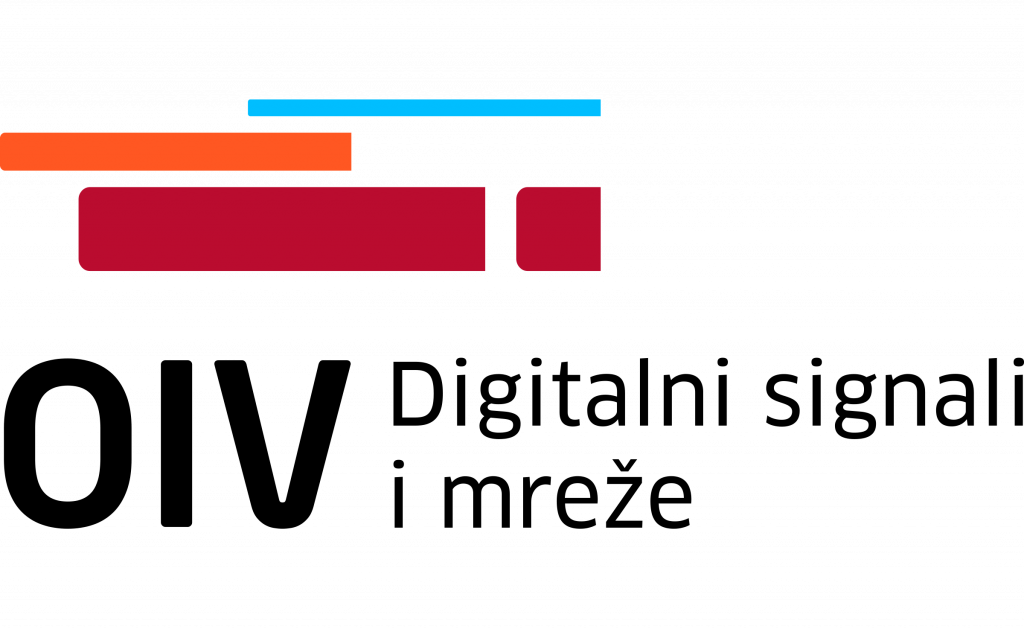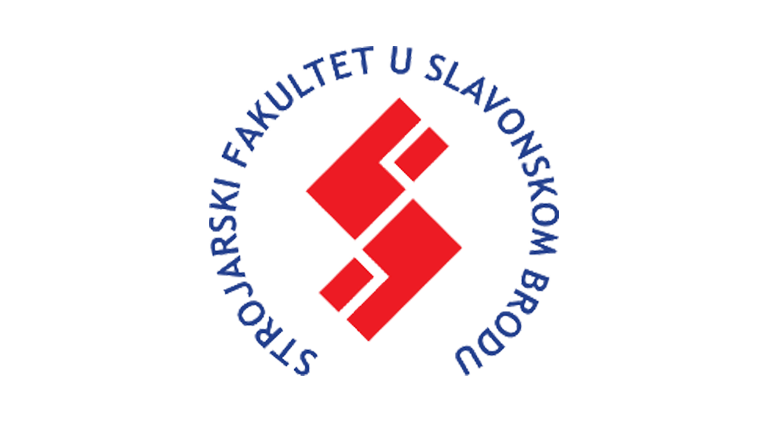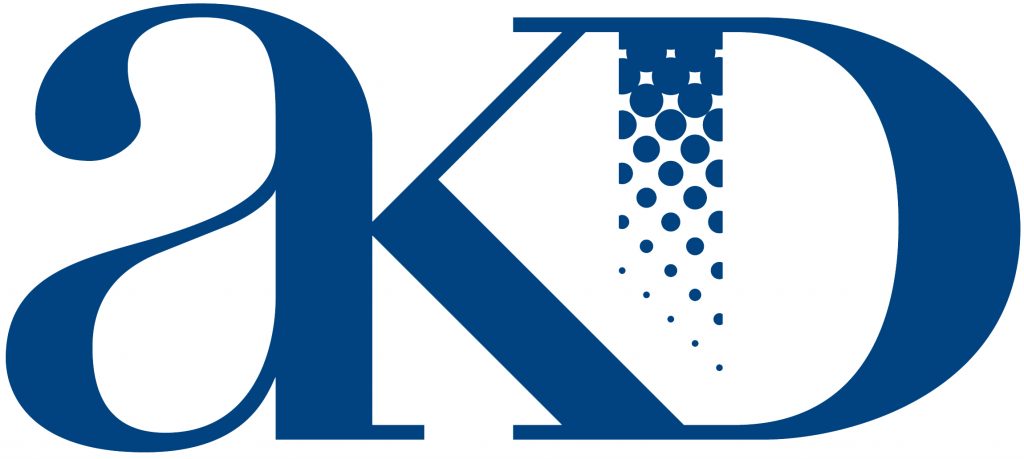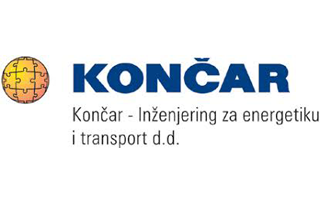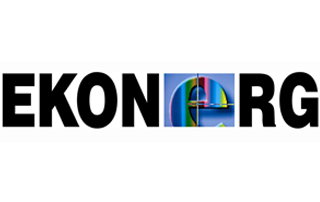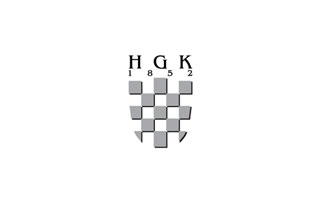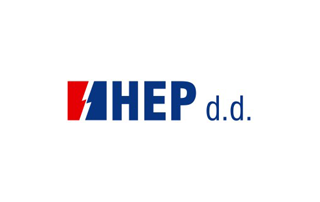
SST2020, October 14-16 2020, FERIT, Osijek
CONFERENCE CHAIRS
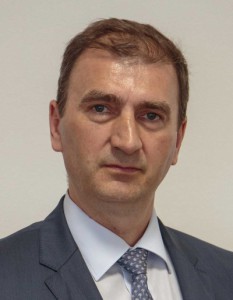
General Chair
Drago Žagar
Faculty of Electrical Engineering, Computer Science and Information Technology Osijek,
Josip Juraj Strossmayer University of Osijek,
Kneza Trpimira 2b, Osijek, Croatia
+385 31 224 602
e-mail:
drago.zagar@ferit.hr
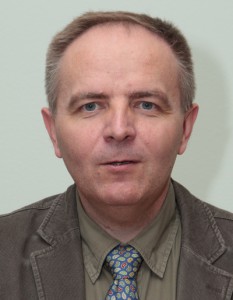
Program Co-Chair
Goran Martinović
Faculty of Electrical Engineering, Computer Science and Information Technology Osijek,
Josip Juraj Strossmayer University of Osijek,
Kneza Trpimira 2b, Osijek, Croatia
+385 31 495 401
e-mail:
goran.martinovic@ferit.hr
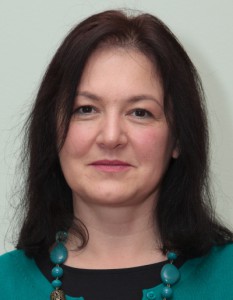
Program Co-Chair
Snježana Rimac Drlje
Faculty of Electrical Engineering, Computer Science and Information Technology Osijek,
Josip Juraj Strossmayer University of Osijek,
Kneza Trpimira 2b, Osijek, Croatia
+385 31 224 759
e-mail:
snjezana.rimac@ferit.hr
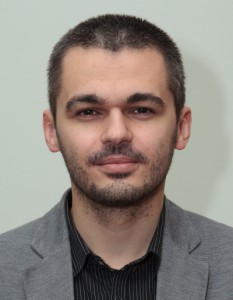
Registration Chair
Kruno Miličević
Faculty of Electrical Engineering, Computer Science and Information Technology Osijek,
Josip Juraj Strossmayer University of Osijek,
Kneza Trpimira 2b, Osijek, Croatia
+385 31 495 401
e-mail:
kruno.milicevic@ferit.hr
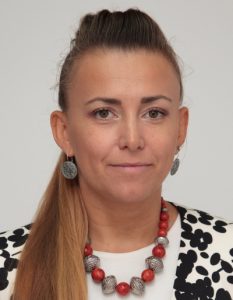
Publication Chair
Irena Galić
Faculty of Electrical Engineering, Computer Science and Information Technology Osijek,
Josip Juraj Strossmayer University of Osijek,
Kneza Trpimira 2b, Osijek, Croatia
+385 31 495 427
e-mail:
irena.galic@ferit.hr
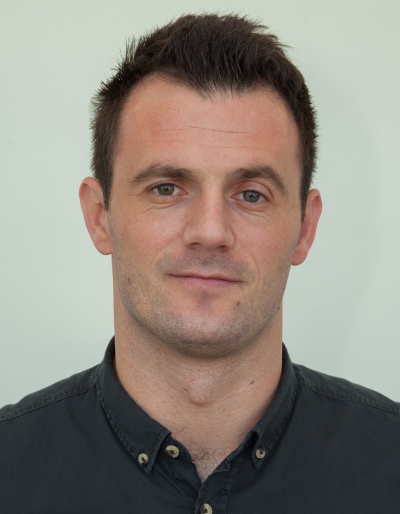
Publicity/Web Chair
Danijel Topić
Faculty of Electrical Engineering, Computer Science and Information Technology Osijek,
Josip Juraj Strossmayer University of Osijek,
Kneza Trpimira 2b, Osijek, Croatia
+385 31 224 614
e-mail:
danijel.topic@ferit.hr
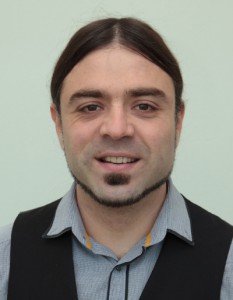
Publicity/Web Chair
Josip Balen
Faculty of Electrical Engineering, Computer Science and Information Technology Osijek,
Josip Juraj Strossmayer University of Osijek,
Kneza Trpimira 2b, Osijek, Croatia
+385 31 224 759
e-mail:
josip.balen@ferit.hr
STEERING COMMITTEE
Matjaž Colnarič
University of Maribor, Slovenia
Ivica Crnković
Chalmers University, Gothenburg, Sweden
Bojan Čukić
University of North Carolina at Charlotte, United States
Leo Budin
Croatian Academy of Sciences and Arts; University of Zagreb, Croatia
Gordan Gledec
University of Zagreb, Croatia
Francisco Gonzalez-Longatt
Faculty of Technology, University of South-Eastern Norway, Norway
Sven Gotovac
University of Split, Croatia
Mislav Grgić
University of Zagreb, Croatia
Norbert Herencsar
Brno University of Technology, Czech Republic
Željko Hocenski
J.J. Strossmayer University of Osijek, Croatia
Frank C. Lambert
Georgia Tech, USA
Ignac Lovrek
Croatian Academy of Sciences and Arts, Croatia
University of Zagreb, Croatia
Ngoc Thanh Nguyen
Wroclaw University of Technology, Poland
Srete Nikolovski
J.J. Strossmayer University of Osijek, Croatia
Milos Oravec
Slovak University of Technology, Bratislava, Slovakia
Davor Pavuna
École Polytechnique Fédérale de Lausanne (EPFL), Switzerland
Sasikumar Punnekkat
Mälardalen University, Sweden
Nedjeljko Perić
University of Zagreb, Croatia
Ivan Samardžić
J.J. Strossmayer University of Osijek, Croatia
Andrea M. Tonello
Alpen-Adria-Universität Klagenfurt, Austria
Mladen Vouk
North Carolina State University
PROGRAM COMMITTEE
Hamid Reza Baghaee
Amirkabir University of Technology, Iran
Adrijan Barić
University of Zagreb, Croatia
Janez Brest
University of Maribor
Zlatko Čović
Subotica Tech, Subotica, Serbia
Igor Fürstner
Subotica Tech, Subotica, Serbia
Radoslav Galić
J.J. Strossmayer University of Osijek
Sonja Grgić
University of Zagreb, Croatia
Daniel Hofman
University of Zagreb, Croatia
Vladimir Katić
University of Novi Sad, Serbia
Tatjana Konjić
University of Sarajevo, Bosnia and Herzegovina
Dražan Kozak
J.J. Strossmayer University of Osijek, Croatia
Dieter Kraus
Hochschule Bremen, City University of Applied Sciences, Germany
Mario Kušek
University of Zagreb, Croatia
Panos Liatsis
Petroleum Institute University and Research Center, United Arab Emirates
Dražen Lučić
Croatian Chamber of Economy, Croatia
Vlado Majstorović
University of Mostar
Maja Matijašević
University of Zagreb, Croatia
Henry Muccini
University of L’Aquila, Italy
Gregor Papa
Jožef Stefan Institute, Slovenia
Vedran Podobnik
University of Zagreb
Marcin Paprzycki
IBS PAN and WSM, Poland
Slavko Rupčić
J.J. Strossmayer University of Osijek
Vlado Sruk
University of Zagreb
Dejan Škvorc
University of Zagreb, Croatia
Damir Šljivac
J.J. Strossmayer University of Osijek, Croatia
Marinko Stojkov
J.J. Strossmayer University of Osijek, Croatia
Massimo Villari
University of Messina, Italy
Tomislav Volaric
University of Mostar
Mario Vražić
University of Zagreb
Ivan Yatchev
Technical University of Sofia, Bulgaria
Mario Žagar
University of Zagreb, Croatia
KEYNOTE SPEAKERS
Professor Henry Muccini, Ph.D.
Department of Information Engineering, Computer Science and Mathematics
University of L’Aquila, Italy
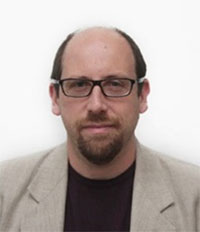
Title: Software Engineering of Cyber-Physical Spaces for Sustainable Tourism
Abstract: The term Cyber-Physical Space is used to identify physical spaces that are enriched by digital software and hardware components, such as RFID, IoT devices, NFC, and more. The applications we engineer are becoming more and more cyber-physical spaces related: think to indoor localization and positioning, to crowd management applications, to context-aware applications reacting to people in proximity. This talk will illustrate my team experience in the engineering of software for cyber-physical spaces applied to the tourism industry. I will use the UFFIZI Galleries crowd management project, as well as the Researcher Night application to illustrate the challenges and opportunities in the field. The CAPS modeling language for cyber-physical spaces engineering will be illustrated as well.
CV: My main research is on how to engineer software running nowadays smart systems. More specifically, my main competence is on architecting smart modern systems, including IoT Architectures for smart cities, data-driven Microservice-based architectures, Architecting Self-Adaptive IoT Systems with Machine Learning. I am currently the head of the CINI Smart Cities and Communities Lab at the University of L’Aquila, I am leading the crowd-management project with the Uffizi Galleries in Florence. I have the pleasure to serve as associated editor in chief for IEEE Software, as well as steering committee co-chair of the ICSA int. conference on Software Architecture, steering committee chair of the MOBILESoft Int. conference on Mobile Software Engineering and Systems. I am also proud to be the head of the study programs in Computer Science at the University of L’Aquila, as well as the coordinator of the Master in Mobile and Web Technologies.
Univ.Prof. Dr.techn. Markus Rupp
Technische Universität Wien, Austria
Institute of Telecommunications

Title: Wireless Communications of the Future
Markus Rupp, Bashar Tahir
Abstract: The UN predicts cities to increase dramatically in size in the coming years. As more and more shares of the human population will live in cities, such new cities face plenty of novel challenges: public transportation next to individual traffic will increase, requiring more efficient planning and scheduling as well as safety regulations. More energy demands require efficient control of limited and expensive resources. All of these demands require a novel wireless infrastructure. As a consequence of such dramatic changes that we will face in the coming two decades, the constraints on wireless networks will also need to be changed considerably. This presentation will exemplary show various research activities concerning NOMA techniques that are intended to solve such new problems
CV: Markus Rupp (IEEE Fellow) received his Dipl.-Ing. degree in 1988 at the University of Saarbruecken, Germany and his Dr.-Ing. degree in 1993 at the Technische Universitaet Darmstadt, Germany, where he worked with Eberhardt Haensler on designing new algorithms for acoustical and electrical echo compensation. From November 1993 until July 1995, he had a postdoctoral position at the University of Santa Barbara, California with Sanjit Mitra where he worked with Ali H.Sayed on a robustness description of adaptive filters with impact on neural networks and active noise control. From October 1995 until August 2001 he was a member of Technical Staff in the Wireless Technology Research Department of Bell-Labs at Crawford Hill, NJ, where he worked on various topics related to adaptive equalization and rapid implementation for IS-136, 802.11 and UMTS, including the first MIMO prototype for UMTS as well as the first WiFi prototypes. Since October 2001 he is a full professor for Digital Signal Processing in Mobile Communications at the Vienna University of Technology where he founded the Christian-Doppler Laboratory for Design Methodology of Signal Processing Algorithms in 2002 at the Institute for Communications and RF Engineering (now Institute of Telecommunications).
He served as Dean from 2005-2007 and 2016-2019 as well as Head of Institute from 2014-2015. From 2015-2019 he had a joined agreement with TU Brno, Czech Republic, supervising the wireless communication group there. He was associate editor of IEEE Transactions on Signal Processing from 2002-2005, JES EURASIP Journal on Embedded Systems from 2004-2019, and is currently associate editor of JASP EURASIP Journal of Advances in Signal Processing. He was elected AdCom member of EURASIP from 2004-2012 and served as president of EURASIP from 2009-2010. He authored and co-authored more than 600 scientific papers and patents on adaptive filtering, wireless communications, and rapid prototyping, as well as automatic design methods.
ORGANIZING COMMITTEE
Ivan Aleksi
J.J. Strossmayer University of Osijek, Croatia
Dragana Božić Lenard
J.J. Strossmayer University of Osijek, Croatia
Dario Došen
J.J. Strossmayer University of Osijek, Croatia
Mario Dudjak
J.J. Strossmayer University of Osijek, Croatia
Ivanka Ferčec
J.J. Strossmayer University of Osijek, Croatia
Luka Filipović
J.J. Strossmayer University of Osijek, Croatia
Mirela Glavaš
J.J. Strossmayer University of Osijek, Croatia
Marija Habijan
J.J. Strossmayer University of Osijek, Croatia
Mirta Hanzer
J.J. Strossmayer University of Osijek, Croatia
Željko Jeršek
J.J. Strossmayer University of Osijek, Croatia
Ružica Kljajić
J.J. Strossmayer University of Osijek, Croatia
Luka Loina
J.J. Strossmayer University of Osijek, Croatia
Jasminka Majdandžić
J.J. Strossmayer University of Osijek, Croatia
Tomislav Matić
J.J. Strossmayer University of Osijek, Croatia
Krešimir Miklošević
J.J. Strossmayer University of Osijek, Croatia
Mario Miloloža
J.J. Strossmayer University of Osijek, Croatia
Filip Novoselnik
J.J. Strossmayer University of Osijek, Croatia
Krešimir Romić
J.J. Strossmayer University of Osijek, Croatia
Goran Rozing
J.J. Strossmayer University of Osijek, Croatia
Robert Šojo
J.J. Strossmayer University of Osijek, Croatia
Ana Šokčević
J.J. Strossmayer University of Osijek, Croatia
Željko Špoljarić
J.J. Strossmayer University of Osijek, Croatia
Tihana Vajnand
J.J. Strossmayer University of Osijek, Croatia
Krešimir Vdovjak
J.J. Strossmayer University of Osijek, Croatia
Jelena Vlaović
J.J. Strossmayer University of Osijek, Croatia
Davor Vrandečić
J.J. Strossmayer University of Osijek, Croatia
Matej Žnidarec
J.J. Strossmayer University of Osijek, Croatia
IMPORTANT DATES
CONFERENCE
Extended deadline (Final)
21st June, 2020
Conference paper submission
deadline
21st July, 2020
Notification of conference paper acceptance
28th July, 2020
Final conference paper submission
25th September, 2020
Conference registration
SPECIAL SESSION AND WORKSHOP PROPOSALS
15th March, 2020
Workshop and special session proposal submission
31st March, 2020
Workshop and special session proposal acceptance
1st May, 2020
Workshop/special session paper submission
15th June, 2020
Notification of workshop/special session paper acceptance
6th July, 2020
Final paper submission
14th September, 2020
Workshop/special session registration
TOPICS
Topics for submission include but are not limited to:
- Affective Computing
- Agriculture Automation
- Applied Electromagnetics in Smart Systems
- Big Data and Smart Systems
- Biometrics and Smart Systems
- Cloud Computing
- Communication Systems
- Computational Intelligence
- Control Systems and Robotics
- Cyber-Physical Systems
- Dependable Computer Systems
- Embedded Computer Systems
- Green Communication
- Green Computing
- High Performance Computing
- Image and Video Processing
- Intelligent Power Systems and Environments
- Intelligent Transportation Systems
- Internet of Things
- Mobile and Wireless Networks
- Security and Privacy
- Smart Antennas
- Smart Health
- Smart Homes and Cities
- Smart Systems and Technologies in Education
- Smart Systems for Green Energy
- Smart Systems in Business
- Software Engineering for Smart Systems
SST 2020 – CONFERENCE PROGRAM
Conference venue: Hotel Osijek, Šamačka ul. 4, 31000, Osijek, Croatia
Wednesday, 14 October 2020
Greetings
(Room A – Lipa)
9:00 AM
General Chair: Professor Drago Žagar, Ph.D.
Keynote Lecture 1
(Room A – Lipa)
9:00 AM – 10:00 AM
Professor Henry Muccini, Ph.D.,
Software Engineering of Cyber-Physical Spaces for Sustainable Tourism
Department of Information Engineering, Computer Science and Mathematics,
University of L’Aquila, Italy
Smart Energy I
(Room A – Lipa)
10:00 AM – 11:20 AM
Chairs: Srete Nikolovski, Zvonimir Klaić
Ivica Petrović, Srete Nikolovski, Hrvoje Glavaš and Filip Relić
Analysis of Fuzzy Logic, Application in Power System Fault Detection Automation
Mario Šipoš, Zvonimir Klaić, Emmanuel Karlo Nyarko, Krešimir Fekete, Mario Primorac and Damir Šljivac
Determining the Fault Position in the Power System
Ružica Kljajić, Predrag Marić, Filip Relić and Hrvoje Glavaš
Battery Energy Storage Systems and FACTS Devices Influence on Microgrid Voltage Stability
Daniel Pettersen, Emil Melfald, Abir Chowdhury, Martha N. Acosta, Francisco Gonzalez-Longatt and Danijel Topić
TSO–DSO Performance Considering Volt-Var Control at Smart-Inverters: Case of Vestfold and Telemark in Norway
Computational Intelligence in Smart Systems
(Room B – Kesten)
10:00 AM – 11:20 AM
Chairs: Ratko Grbić, Dražen Bajer
Branimir Škugor, Jakov Topić, Joško Deur, Vladimir Ivanović and Eric Tseng
Analysis of a Game Theory-based Model of Vehicle-Pedestrian Interaction at Uncontrolled Crosswalks
Enkeleda Bocaj, Dimitris Uzunidis, Panagiotis Kasnesis and Charalampos Patrikakis
On the Benefits of Deep Convolutional Neural Networks on Animal Activity Recognition
Bruno Zorić, Dražen Bajer and Mario Dudjak
Wrapper-Based Feature Selection via Differential Evolution: Benchmarking Different Discretisation Techniques
Dražen Bajer, Mario Dudjak and Bruno Zorić
Wrapper-Based Feature Selection: How Important is the Wrapped Classifier?
Coffee Break
11:20 AM – 11:50 AM
Computer Engineering Solutions in Smart Systems
(Room B – Kesten)
11:50 AM – 12:50 PM
Chairs: Željko Hocenski, Josip Balen
Michal Kvet and Karol Matiasko
Analysis of Current Trends in Relational Database Indexing
Marko Boras, Josip Balen and Krešimir Vdovjak
Performance Evaluation of Linux Operating Systems
Filip Sušac, Tomislav Matić, Ivan Vidović, Ivan Aleksi and Željko Hocenski
Smart Sticker: Concept for Better Storage and Transportation
Lunch (Restaurant)
1:00 PM – 2:00 PM
Smart Technologies for Sustainable Agriculture – Workshop
(Room A – Lipa)
2:00 PM – 3:30 PM
Chairs: Drago Žagar, Ivana Podnar Žarko
Ivana Podnar Žarko and Vlatko Galić
IoT-field: project overview and initial results
Damjan Katušić, Pavle Skočir, Mario Kušek and Igor Čavrak
Survey on Low Power Wide Area Networks in IoT
Krešimir Grgić, Drago Žagar, Josip Balen and Jelena Vlaović
Internet of Things in Smart Agriculture – Possibilities and Challenges
Jelena Vlaović, Josip Balen, Krešimir Grgić, Drago Žagar, Vlatko Galić and Domagoj Šimić
An Overview of Chlorophyll Fluorescence Measurement Process, Meters and Methods
Igor Hrovatič
FAIRhare, i2connect &WiseFarmer EU projects – Strong driver on Farmers digitalisation
RESCUE – Special Session
(Room B – Kesten)
2:00 PM – 3:30 PM
Chairs: Damir Šljivac, Marinko Stojkov, Boris Dumnić
Boris Dumnić, Bane Popadić, Dragan Milićević, Damir Šljivac, Matej Žnidarec, Marinko Stojkov, Antun Barac, Edita Stokić, Budislav Petrović, Zorislav Guttler and Dejan Ferić
Renewable Energy Sources for smart sustainable health Centers, University Education and other public buildings
Matej Žnidarec, Damir Šljivac, Dario Došen and Branka Nakomčić-Smaragdakis
Performance Evaluation of Simple PV Microgrid Energy Management System
Marinko Stojkov, Krešimir Crnogorac, Damir Šljivac, Ante Čikić, Ivan Samardžić, Antun Stoić, Mladen Hercog, Bernarda Crnogorac, Tomislav Alinjak and Mladen Bošnjaković
Reducing Energy Consumption and Optimisation of Indoor Living Parameters
Barbara Vujkov, Boris Dumnić, Bane Popadić, Tatjana Grbić and Dragan Milićević
Optimal Energy Management in Public Buildings Using Mixed-Integer Linear Programming
Coffee Break
3:30 PM – 4:00 PM
Smart Energy II
(Room A – Lipa)
4:00 PM – 5:20 PM
Chairs: Goran Knežević, Krešimir Fekete
Goran Knežević, Monika Maligec, Velimir Golub and Danijel Topić
The Optimal Utilization of the Battery Storage for a Virtual Prosumer Participating on a Day-Ahead Market
Lejla Bandic, Jasna Hivziefendic, Mirza Sarić and Majda Tešanović
Voltage Regulation of PV System with MPPT and Battery Storage in Microgrid
Božidar Horvatović, Robert Noskov, Krešimir Fekete and Ana Androjić
Operation of the Microgrid with Wind Power Plant: A Case Study
Francisco Gonzalez-Longatt, Martha N. Acosta, Harold R. Chamorro and Danijel Topić
Short-Term Kinetic Energy Forecast using a Structural Time Series Model: Study Case of Nordic Power System
Smart Systems Modelling and Education
(Room B – Kesten)
4:00 PM – 5:00 PM
Chairs: Emmanuel Karlo Nyarko, Denis Pelin
Dinka Lale, Marko Oršulić and Ivana Palunko
Modelling and Soft-Start Control of Measurement and Transport Line
Branimir Škugor and Joško Deur
City Bus Mass Estimation Based on GPS and CAN-Collected Tracking Data
Andrej Brandis, Denis Pelin, Danijel Topić and Matej Žnidarec
Smart-Scaled RES Equipment as a Practical Tool for Teaching Students
8:00 PM – 11:00 PM
Welcome Reception
Thursday, 15 October 2020
Wireless Communications and Networks
(Room B – Kesten)
8:30 AM – 9:30 AM
Chairs: Slavko Rupčić, Krešimir Grgić
Vanja Mandrić Radivojević, Slavko Rupčić, Ivana Miličević and Irena Ištoka Otković
Electromagnetic Wave Attenuation by Plane Concrete in the Frequency Range of 4G and 5G Systems
Vanja Mandrić Radivojević, Slavko Rupčić, Nataša Nešić and Anđelko Lišnjić
Reflection Coefficient of Circular Waveguide Aperture Antenna Covered by Dielectric Radome
Ana Burušić, Josip Balen and Kruno Semialjac
Review and Analysis of Bio-Inspired Routing Protocols in VANETs
Smart Energy III
(Room A – Lipa)
8:30 AM – 9:50 AM
Chairs: Hrvoje Glavaš, Tomislav Capuder
Chittaranjan Pradhan and Terje Gjengedal
Adaptive Jaya Algorithm for Optimized PI-PD Cascade Controller of Load Frequency Control in Interconnected Two-Area Power System
Jose A. Barrios-Gomez, Francisco Sanchez, Gianfranco Claudio, Francisco Gonzalez-Longatt, Martha N. Acosta and Danijel Topić
RoCoF Calculation Using Low-Cost Hardware in the Loop: Multi-area Nordic Power System
Harold R. Chamorro, Francisco Gonzalez-Longatt, Danijel Topic, Maude J. Blondin, Vijay K. Sood and Wilmar Martinez
Multi-Objective Approach for Hydro Governors Control Tuning
Ivan Sudić, Matko Mesar, Bojan Franc, Tomislav Capuder, Tomislav Ivanković, Krunoslav Pavić and Ivica Pavić
Short-Term Transmission System Losses Forecast Based on Supervised Machine Learning
Technical Lecture 1
(Room B – Kesten)
10:00 AM – 10:30 AM
Kristina Leko Kuštrak
AKD u projektima digitalne transformacije
AKD d.o.o., Zagreb, Croatia
Coffee Break
10:30 AM – 11:00 AM
Opening Ceremony
(Room B – Kesten)
11:00 AM – 11:30 AM
Chairs: Drago Žagar, Snježana Rimac Drlje, Goran Martinović, Kruno Miličević, Irena Galić, Josip Balen, Danijel Topić
Keynote Lecture 2:
(Room B – Kesten)
11:30 AM – 12:30 PM
Univ.Prof. Dr.techn. Markus Rupp, Wireless Communications of the Future
Institute of Telecommunications, Technische Universität Wien, Vienna, Austria
Technical Lecture 2
(Room B – Kesten)
12:30 PM – 1:00 PM
Karla Kurjan
HbbTV usluge
Odašiljači i veze d.o.o., Zagreb, Croatia
Lunch (Restaurant)
1:00 PM – 2:30 PM
Smart Grid and Internet of Energy – Workshop
(Room B – Kesten)
2:30 PM – 4:00 PM
Chairs: Denis Vranješ, Marko Vukobratović
Marko Vukobratović, Mario Hercog, Ivan Varga, Domagoj Vuković, Zvonimir Klaić and Denis Vranješ
Survey of Methods for Advanced Distribution Management Systems
Marko Vukobratović, Mario Hercog, Ivan Varga, Domagoj Vuković, Branimir Valentić, Marijana Liović, Juraj Pivac and Bojan Bijelić
Smart Electrical Grid Integration Platform – SEGIP: Overview of the Project Scope and Goals
Smart transmission system for wide wind energy integration
(Room B – Kesten)
4:00 PM – 5:30 PM
Contributors: Ninoslav Holjevac, Tomislav Baškarad, Josip Đaković, Matej Krpan, Igor Kuzle, Bojan Franc, Igor Ivanković, Antun Adrić, Boris Avramović, Renata Rubeša, Goran Levačić, Nenad Švarc.
City Tour, Gala Dinner and Awards Ceremony
6:00 PM – 10:00 PM
City Tour (6:00 PM), Gala Dinner and Awards Ceremony (8:00 PM)
Friday, 16 October 2020
Energy Communities for Citizen Participation in the Energy Network – Workshop
(Room A – Lipa)
9:00 AM – 10:30 AM
Speakers: Andrej F. Gubina, Tomi Medved, Gašper Artač, Boris Pavlin
Image and Video Processing
(Room A – Lipa)
10:30 AM – 11:30 AM
Chairs: Mario Vranješ, Snježana Rimac Drlje
Danijel Babić, Matija Pul, Luka Umiljanović and Mario Vranješ
Automotive Video Data Gathering and Reproduction Tool
Jelena Vlaović, Drago Žagar, Snježana Rimac-Drlje and Luka Filipović
Comparison of Representation Switching Number and Achieved Bit-Rate in DASH Algorithms
Dina Jukić, Hrvoje Glavaš, Željko Jeršek and Nikola Veić
Photometric Testing of a Liquid Crystal Display
Closing Ceremony
(Room A – Lipa)
11:30 AM – 12:00 AM
Coffee and Light Lunch
12:00 AM – 13:00 PM
WORKSHOP
Energy Communities for Citizen Participation in the Energy Network
Friday, 16 October 2020, Osijek, Croatia
“Following European Commission (EC) recommendations and its document “Guidelines to the Rules on Open Access to Scientific Publications and Open Access to Research Data in Horizon 2020″ we would like to inform you that interested audience can attend this workshop free of charge!”
In the context of fighting the climate change and reducing emissions of greenhouse gases, the use of renewable energy sources is essential. Yet the varying and uncertain nature of these sources entails the design and the implementation of a new model of the energy network. The old centralised energy distribution system is transitioning towards a smaller-scale, decentralised and democratized system, where individual prosumers can have a direct link to the power network. Energy communities appear to be meeting the need of new decentralized energy ‘ecosystems’, as well as being beneficial to every stakeholder of these communities.
However, energy communities are in various stages of the development throughout Europe. Apart from a few countries (e.g. Austria, Slovenia, Denmark, Germany or the Netherlands), most projects are still in their infancy. Therefore stronger frameworks need to be provided, at local, national, and international levels, and people need to be informed about energy communities benefits and encouraged to take part in them.
Current Regulation Framework
Different types of energy communities are defined on European or national levels (e.g. renewable energy communities (RECs), citizen energy communities (CECs), local energy communities (LECs)). Some projects have already seen the light of the day and new opportunities, new roles and networks have been observed. For example, consumers are able to generate power from renewable energy and thus become ‘prosumers’, and collaborative organisation can take on the management of local grids.
Energy communities intend to place the consumer at the heart of the energy transition, as is required by the Clean Energy for all Europeans Package (European Commission, 2016). Thus, they have been defined and regulated in two directives: the recast Renewable Energy Directive (2018/2001) and the recast Electricity Market Directive (2019/944). The first Directive defines renewable energy communities as autonomous communities based on open and voluntary participation where members and shareholders, who are located in the proximity of the renewable energy projects, have effective control over the community. The second Directive defines citizen energy communities in a similar way with two major differences: the notion of the proximity of the member or shareholder of the community is not mentioned, and the energy projects can include other sources of energy than renewables. The current European legislation leaves space for national interpretation and implementation of energy communities in order to let the Member States organise and support new projects of energy communities.
Potential Benefits of Energy Communities
Energy communities of any kind can bring numerous benefits to its members. Economically, they create employment opportunities and local value by revitalising the local economy and increase the security of supply. Environmentally, the local energy production aims at reducing greenhouse gases emissions and thus prevent air pollution. And socially, energy communities promote education regarding energy saving and efficiency, foster energy autonomy, create energy democracy (e.g. with the cooperative principle one member-one vote), energy justice by addressing the energy poverty (which can be ensured by affordable energy for all consumers), and they can also build up social cohesion and trust. This variety of benefits, on top of the development of sustainable energy technologies, can also favour the change toward the decentralisation of the energy network.

Workshop: COMPILE – Integrating Community Power in Energy Islands
Prof. Andrej F. Gubina from University of Ljubljana (UL) will open the workshop and present the overview of EU progress in the field of Energy Communities, their definitions and best practices around the EU. Dr. Tomi Medved (UL) will present the project COMPILE – Integrating Community Power in Energy Islands which main aim is to show the opportunities of energy islands for decarbonisation of energy supply, community building and creating environmental and socioeconomic benefits. Dr. Gašper Artač from PETROL will present the pilot site Luče, the first energy community in Slovenia, and Mr. Boris Pavlin from Zelena Energetska Zadruga will present pilot site Križevci and their experiences with crowdlending campaigns “Sunny roofs”.
Speakers:
- Prof. Andrej F. Gubina, Faculty of El. Engineering, University of Ljubljana, Slovenia
- Tomi Medved, Faculty of El. Engineering, University of Ljubljana, Slovenia
- Gašper Artač, Petrol d.d., Slovenia
- Boris Pavlin, Zelena Energetska Zadruga, Križevci, Croatia
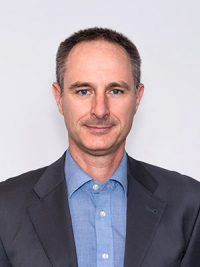
Assoc. Prof. Andrej F. Gubina, PhD., graduated (1993) and received his doctorate (2002) at the Faculty of Electrical Engineering, University of Ljubljana. Between 2002 and 2005, he headed the Risk Management Department at Holding Slovenske elektrarne d.o.o., Ljubljana. Since March 2007, he is a Senior Researcher and Head of the Laboratory for Energy Policy at the Faculty of Electrical Engineering. Currently, he is the Project Coordinator of H2020 EU project COMPILE.
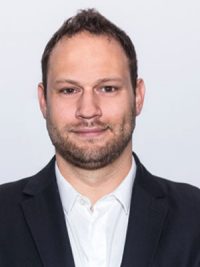
Tomi Medved, PhD., graduated (2012) and received his doctorate (2019) at the Faculty of Electrical Engineering, University of Ljubljana. From 2013 to 2017 he was employed at Elektro Energija d.o.o., the biggest electricity retail company in Slovenia, where he worked in risk management and market analytics department. Currently he is working as a senior researcher at the Laboratory of Energy Policy (LEST). His main research topics are Smart Grids, renewable integration, demand response optimization, electricity markets modelling and policy design. Currently, he is the Deputy Project Coordinator of H2020 EU project COMPILE.
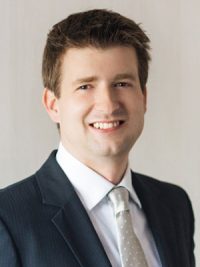
Gašper Artač, PhD., graduated (2008) and received his doctorate (2013) at the Faculty of Electrical Engineering, University of Ljubljana. From 2008 to 2013, he was a young researcher from the industry of the company GEN-I, d.o.o. and at the Faculty of Electrical Engineering, University of Ljubljana. In the year 2013 until the end of 2016, he was employed by GEN-I, d.o.o. first as a market analyst and later as a senior market analyst. He is currently employed as Head of the Energy Management Centre in Petrol d.d., where he is responsible for the development of the Energy Management Centre and the development of analytical support for trading and purchasing energy products.
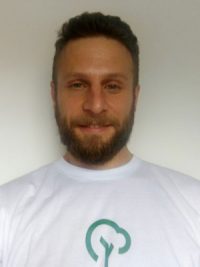
Boris Pavlin, PhD., is an energy efficiency and renewable energy expert. Within the ZEZ coop, he works as the project manager for EU projects in the area of RES, sustainable development and energy independent regions. He is the main author of many studies, including innovative models of RES utilization in Croatia. Boris obtained his doctoral degree in the PhD program “Sustainable Energy and Technologies” from the University of Bolzano in Italy and is one of the coop’s founding members.
WORKSHOP
Interreg IPA CBC Croatia Serbia RESCUE project presentation
Workshop focus:
Workshop presents a comprehensive studies on energy demand and energy efficiency for seven project partners public buildings in Croatia and in Serbia. Available renewable energy sources that could be used for energy generation in the near vicinity of the public building are assesed and proposed optimal configuration of the renewable energy and the smart building energy management systems (BEMS) will be presented that would significantly increase the public building efficiency while reducing the energy demand, bringing the public building one step closer to near zero-energy building. Workshop would also give a short overview of the most important directives and national legislative supporting energy efficiency and renewable sources focusing on public buildings sector. After presentation of the smart building energy management systems second part of the workshop will include visit o the construction site of the FERIT Osijek smart building.
Workshop presenters:
Prof Boris Dumnić, PhD; Prof Bane Popadić, PhD FTN Novi Sad
Prof Damir Šljivac, PhD; Matej Žnidarec, MEng FERIT Osijek
Prof Marinko Stojkov; PhD; Prof Ante Čikić, PhD, SF Slavonski Brod

Renewable Energy Sources for smart sustainable health Centers, University Education and other public buildings (RESCUE)
Interreg IPAII Croatia Serbia, project number HR-RS303
Start Date: 01.04.2019 End date: 30.09.2021.
Web page: https://rescue-ipa.eu/
Facebook page: https://www.facebook.com/rescueipa
Instagram page: https://www.instagram.com/rescue.ipa
Partners: Faculty of Technical Sciences (FTN), Novi Sad Serbia (lead), Faculty of Electrical Engineering, Computer Science ad Information Technology (FERIT) Osijek, Machine Engineering Faculty (SFSB) Slavonski Brod, Croatia, Clinical Center of Vojvodina (KCV) Novi Sad Serbia, Clinical Hospital Center (KBCO) Osijek, Croatia
Project summary:
The three key targets of EU 2020 climate and energy package are: 20% cut in greenhouse gases emissions (compared to 1990), 20% of EU energy from Renewable Energy Sources (RES) and 20% improvement in Energy Efficiency (EE). Usage of RES and EE measures in public buildings are important part in achieving these targets. Region has diverse RES potential but the share of RES is far behind EU2020 goals. Even with new legislation, public’s inherited inertness and unawareness of benefits in improving RES usage and EE of existing public buildings still remains a major concern.
Main goal of this project is therefore to demonstrate innovative RES and EE approach for public buildings in the cross-border region. FERIT and FTN gained substantial know-how in the field of RES by implementing small-scale RES on their public buildings through successful cooperation on bilateral projects aiming to establish common research and education frame in the cross-border region. This project will strengthen this cooperation and involve new partners – KCV, KBCO and SFSB.
Within the RESCUE project we are aiming to promote the use of sustainable energy and energy efficiency in public buildings (specific objective 2.2), especially in public buildings with high energy demand. By introduction of RES based energy efficient smart Buildings Energy Management Systems (BEMS), RESCUE seeks to demonstrate sustainable, low-carbon solution for health centers and university education buildings, demonstrating applicability to other public buildings.
Transferring know-how from university to healthcare a climate-smart solution will help reduce healthcare’s climate footprint and yield multiple benefits. This way health centers and university education public buildings are no longer exempt from playing an important role as an environmental leader in the region. All targeted groups will benefit from resulting knowledge transfer, workshops, publications, project conferences, printed and digital promotion material.
WORKSHOP
Smart technologies for sustainable agriculture
Date and time
October 14th, 2020 (2:00 PM)
Venue
Hotel Osijek, Šamačka 4, 31000 Osijek, Croatia
Overview
Application of modern information and communication technologies in the agricultural sector can significantly increase the efficiency of agricultural land use, which will result in increased quantity and quality of agricultural yields and in reduced negative impact of climate change. The aim of the workshop is to present the latest research and technologies in the field of smart agriculture that are applied globally, to describe the current situation at the local and national levels, to detect important problems and challenges in the field and to propose adequate solutions. Furthermore, the plan and preliminary results of the scientific research project “IoT-field: An Ecosystem of Networked Devices and Services for IoT Solutions Applied in Agriculture” will be presented.
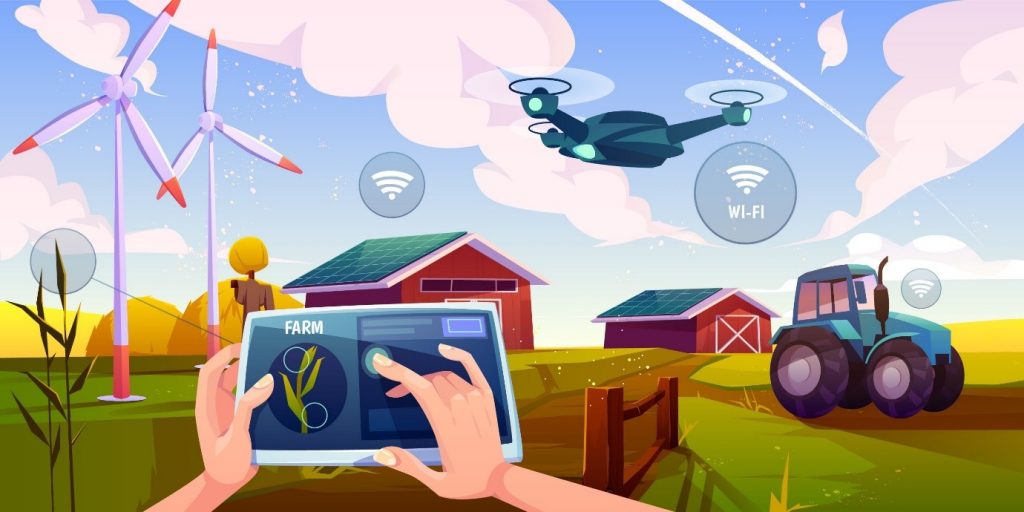
Project: “IoT-field: An Ecosystem of Networked Devices and Services for IoT Solutions Applied in Agriculture” will be presented

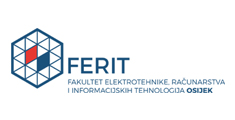
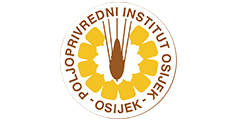
The project is financed from the European Regional Development Fund (ERDF) and conducted by the three following scientific research institutions from Croatia: FER Zagreb, FERIT Osijek and Agricultural Institute Osijek. The goal of the project is to increase market-oriented R&D activities in the areas of Internet of Things and Plant Sciences to establish an ecosystem of networked devices and innovative services with application in agriculture. Project activities are focused on the research and development of interoperable and secure technical solutions for an ecosystem enabling the collection and advanced processing of real-time microclimate and agronomic data to improve plant production in the Republic of Croatia. The project will enable transfer of knowledge and technology to Croatian ICT companies and increase the competitiveness of family farms. Project leader is Ivana Podnar Zarko, Ph.D. from FER, and its value is 6,672,806.98 HRK.
Paper Submission and Publication
Paper submission and publication process is the same as for the main SST2020 conference. All accepted papers will be published in the SST2020 Conference Proceedings.
Workshop Chairs
prof. dr. sc. Drago Žagar
prof. dr. sc. Ivana Podnar Žarko
Workshop program
Ivana Podnar Žarko and Domagoj Šimić
IoT-field: project overview and initial results
Damjan Katušić, Pavle Skočir, Mario Kušek and Igor Čavrak
Survey on Low Power Wide Area Networks in IoT
Krešimir Grgić, Drago Žagar, Josip Balen and Jelena Vlaović
Internet of Things in Smart Agriculture – Possibilities and Challenges
Jelena Vlaović, Josip Balen, Krešimir Grgić, Drago Žagar, Vlatko Galić and Domagoj Šimić
An Overview of Chlorophyll Fluorescence Measurement Process, Meters and Methods
Contact:
WORKSHOP
Smart Grid and Internet of Energy
Smart grid is characterized by a high degree of information and communication technologies (ICT) integration due to increased demand for automation in power facilities. Due to a large number of various distributed generation units and due to the changes in consumption profile, Smart grid is becoming an indispensable part of Internet-of-Energy (IoE), a technology which achieves space-efficient electricity production, lowers power losses and achieves other significant techno-economic savings by applying smart consumers, smart meters, smart metering and control technology and smart sensors integrated through a paradigm of digital twins, advanced centralized or decentralized management systems, power storage units and manageable generation units. The goal of this workshop is to present the latest global research in the field of Smart grid and the Internet of Energy and to present the fundamental challenges for their implementation in the local or national environment. Additionally, the workshop will present the project plan and so-far results of the research and development project “SEGIP – Smart Electrical Grid integration Platform” in which the project team consists of members from Base58 d.o.o. and the Faculty of Electrical Engineering, Computing and Information Technology Osijek.
WORKSHOP

Wind energy integration in low inertia power system project special session
TITLE: Smart transmission system for wide wind energy integration
DATE: Thursday 15th October 2020 15:30
DURATION: 1.5 hour
ABSTRACT:
Increase in the number of wind power plants that utilize variable speed generators that substitute conventional synchronous generators has led to a decrease in system inertia. This decreases system stability in response to disturbances that causes power swings caused by generator and load outages, or short circuit failures. Renewable energy sources have potential capabilities to provide initial inertia response and ancillary services. The focus of this special session will be on research of renewable energy sources capabilities to provide inertia response and ancillary services. It will identify current status of the power system in Croatia and provide insight into future trends including the ability of wind power plants to provide support to the system balance through the control of inertia response and active power change after disturbances occurrence; the ability to use better production forecasting to alleviate some of the unbalance problems; the approach to powers system planning development that increases the potential of integration. These aspects will be shown through recent results of the research and development project “WINDLIPS – Wind energy integration in low inertia power system” led by Faculty of Electrical Engineering and Computing, University of Zagreb and financed by Croatia Scientific Foundation, Croatian Transmission System Operator HOPS and HEP Generation Ltd.
CONTRIBUTORS: Ninoslav Holjevac, Tomislav Baškarad, Josip Đaković, Matej Krpan, Igor Kuzle, Bojan Franc, Igor Ivanković, Antun Adrić, Boris Avramović, Renata Rubeša, Krešimir Mesić, Nenad Švarc, Ivan Sudić
TOPICS:
1. WINDLIPS project overview and specifics of integration of wind energy in the Croatian power system
Presenter: Ninoslav Holjevac, FER

2. The importance of ROCOF in inverter-based power systems
Presenter: Tomislav Bašakard, FER

3. The importance of wind energy production forecasting
Presenter: Josip Đaković, FER

4. Meteorological data¸and dynamic thermal rating importance in wind energy production
Presenter: Krešimir Mesić and Elvis Mikac, HOPS

5. Fast frequency reserve in low-inertia system
Presenter: Matej Krpan, FER

6. Short-term transmission system losses forecast based on supervised machine learning
Presenter: Ivan Sudić, FER

VENUE
The conference will take place at the Hotel Osijek, located in the centre of Osijek on the Drava river (http://www.hotelosijek.hr/en/).
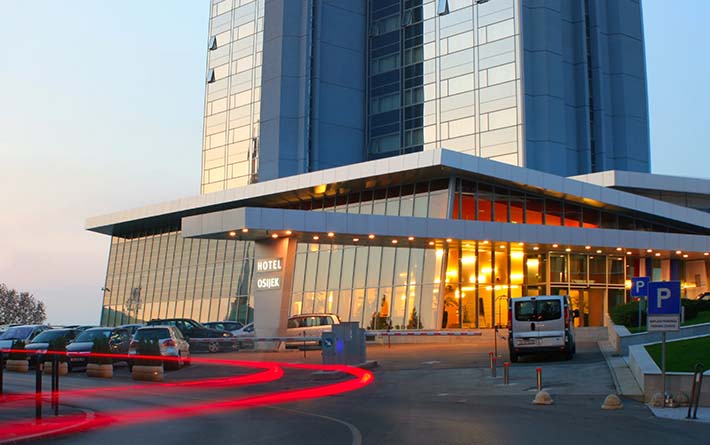

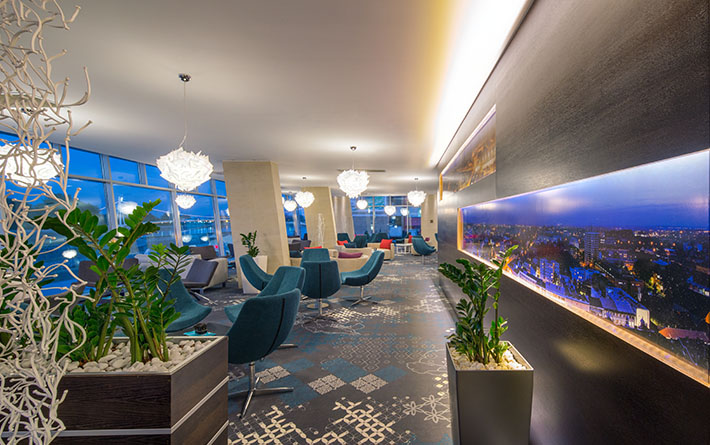
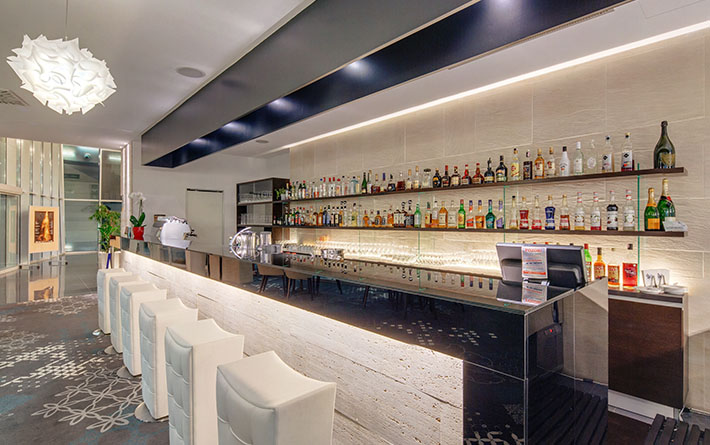
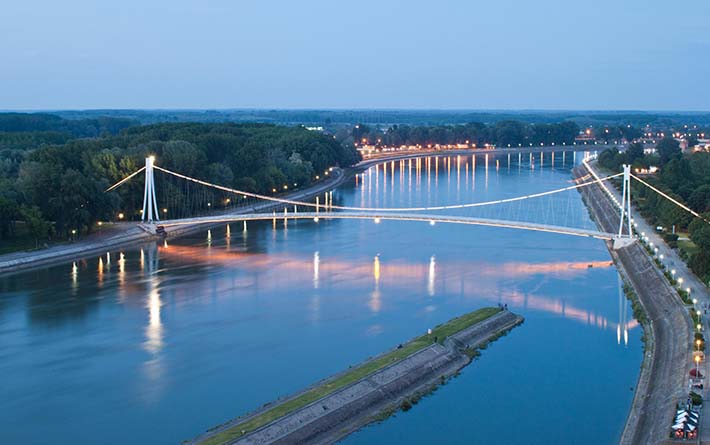
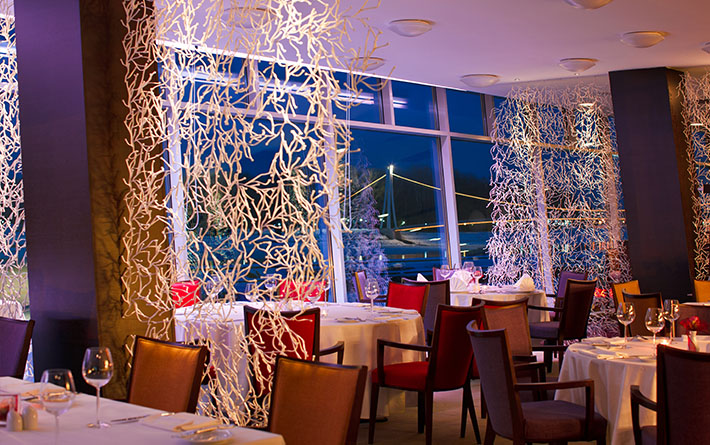
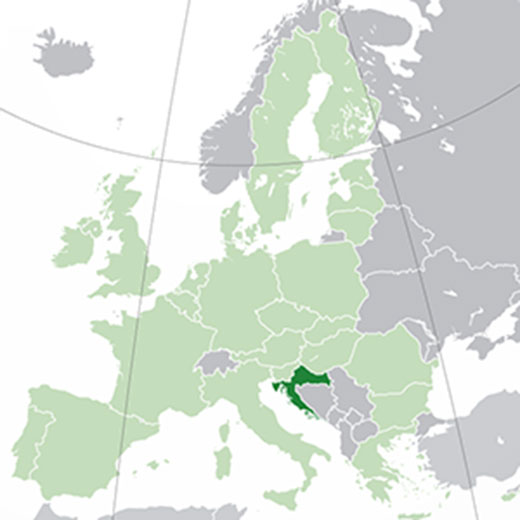
The Republic of Croatia is geographically located between Central and Eastern Europe. It covers the geographical area that extends from the spacious Pannonian Plain across a narrow area of the Dinaric Alps to the Adriatic coast – one of the most indented coastlines in the world. The interior of the country has a moderate continental climate, whereas a pleasant Mediterranean climate prevails along the Adriatic coast.
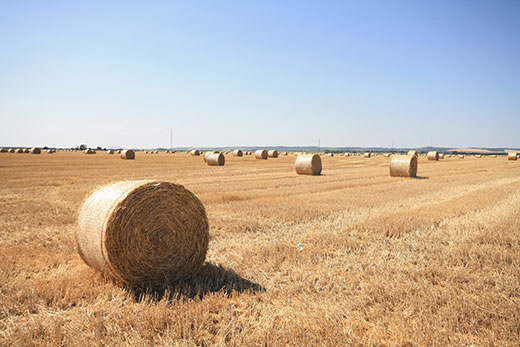
Slavonia and Baranja is a historical region in eastern Croatia. It is surrounded by three rivers; the Sava River (the border with Bosnia and Herzegovina), the Drava River (the border with Hungary) and the Danube (the border with Serbia), forming an area of exceptional beauty with forests, meadows and hills. In Slavonia, there are numerous castles and villas that once belonged to rich families, but now they add a special charm to this part of Croatia. Baranja stretches between the Drava River in the north and the Danube in the east. At the point where the Danube and the Drava River meet, nature has created a remarkable phenomenon – Kopački Rit Nature Park, which is rich in flora and fauna. In 1967, Kopački Rit and its immediate area were declared a nature park and a zoological reserve, respectively.

The largest city in Slavonia, Osijek, which is located on the Drava River, is an interesting tourist destination with numerous parks, cultural monuments and entertainment possibilities. Osijek is the fourth largest city in the Republic of Croatia with about 110,000 inhabitants. It is located in a valley on the right bank of the Drava River. It consists of the Fortress – a baroque city-fortress built in the 18th century, the Upper, the Lower and the New Town, Retfala and the Industrial District. Osijek is the most verdant city in the Republic of Croatia. The 18th century baroque city-fortress of Osijek was built by transforming the then historic city located at the strategic crossing over the Drava River. The first new city-fortress was built within a large strategic system of fortified baroque towns on the border with the Ottoman Empire, which was founded by Prince Eugene of Savoy who began to build it in 1712. The fortress had four gates: The New Gate (south), the Water Gate (north), the Imperial Gate (east) and Valpovo Gate (west). Out of these four gates to the fortress, only one is still present today – the Water Gate, where there is a memorial plaque dedicated to the builder of Osijek fortress, general Stephan von Beckers. It is believed that his body was walled up in the outer wall or rampart.
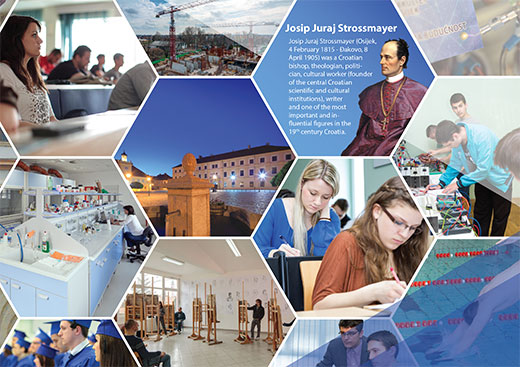
Josip Juraj Strossmayer University of Osijek was established in 1975. It consists of 17 constituent units, i.e., 11 faculties, 5 University departments, 1 Academy of Arts and 3 university infrastructure institutions, i.e., the City and University Library in Osijek, the Student Center in Osijek and the Student Center in Slavonski Brod, as well as the Technology Development Center Osijek Ltd. Today, Josip Juraj Strossmayer University of Osijek has 1,458 employees and about 20,000 students with almost 2,000 students studying at the Faculty of Electrical Engineering. Each year, the number of incoming students doing their practical training and scientists conducting research has been increasing in both the University and the Faculty of Electrical Engineering.
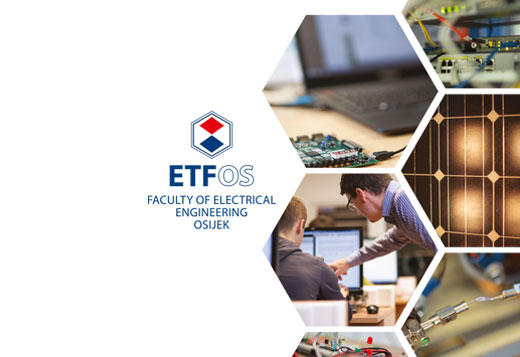
The Faculty of Electrical Engineering, Computer Science and Information Technology in Osijek is a higher education, scientific and research institution that conducts scientific, research, development and educational projects and performs undergraduate, graduate, postgraduate and professional study programs in technical sciences. Higher education curriculum in electrical engineering was first established in Osijek in 1978 as the third study of the kind in the Republic of Croatia. The establishment of the Study of Electromechanical Engineering resulted from an initiative of the University of Osijek and took place in 1977 and 1978.
It was supported by the economy of the city of Osijek and surrounding municipalities in the Slavonia and Baranja region. In 1993, the Faculty of Electrical Engineering Osijek (ETFOS) was founded as a public institution of higher education. Today, it is organized in six departments with a total of fifteen chairs and two accredited laboratories. Through its university and professional study programs, the Faculty of Electrical Engineering, Computer Science and Information Technology in Osijek has been educating and training its staff to be able to keep up with technology advances in the areas of electrical and computer engineering as well as to apply their knowledge to engineering problem solving and, through direct cooperation with industry, to transfer knowledge of new technologies based on new scientific findings. Study programs are in line with European and global trends, but also adapted to the needs of the economy in the environment.
The Faculty of Electrical Engineering, Computer Science and Information Technology in Osijek is also a regional scientific and research center of excellence in the areas of electrical and computer engineering.
SPONSORS, DONORS AND SUPPORT
If you are interested in supporting SST2020 as described on the following link:
please contact kruno.milicevic@ferit.hr.
INDUSTRIAL PARTNER
CO-ORGANIZERS
MAIN CONFERENCE SPONSORS
OTHER SPONSORS AND DONORS
MEDIA PARTNERS
AWARDS
Best Conference Paper Award
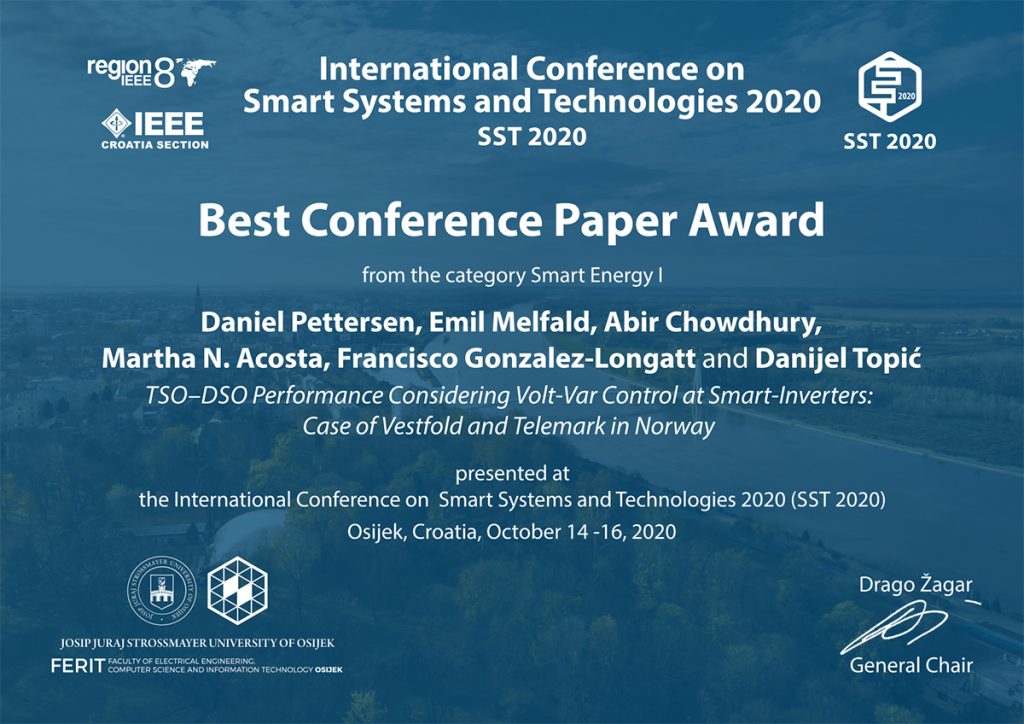
Smart Energy I
Daniel Pettersen, Emil Melfald, Abir Chowdhury,
Martha N. Acosta, Francisco Gonzalez-Longatt and Danijel Topić
TSO–DSO Performance Considering Volt-Var Control at Smart-Inverters:
Case of Vestfold and Telemark in Norway
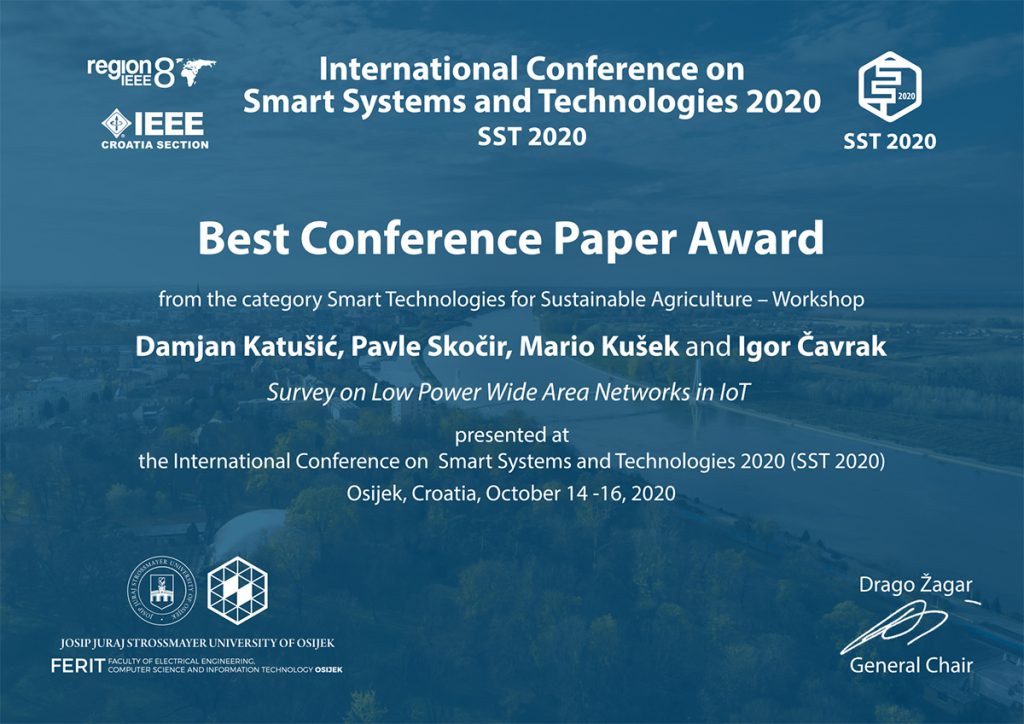
Smart Technologies for Sustainable Agriculture – Workshop
Damjan Katušić, Pavle Skočir, Mario Kušek and Igor Čavrak
Survey on Low Power Wide Area Networks in IoT
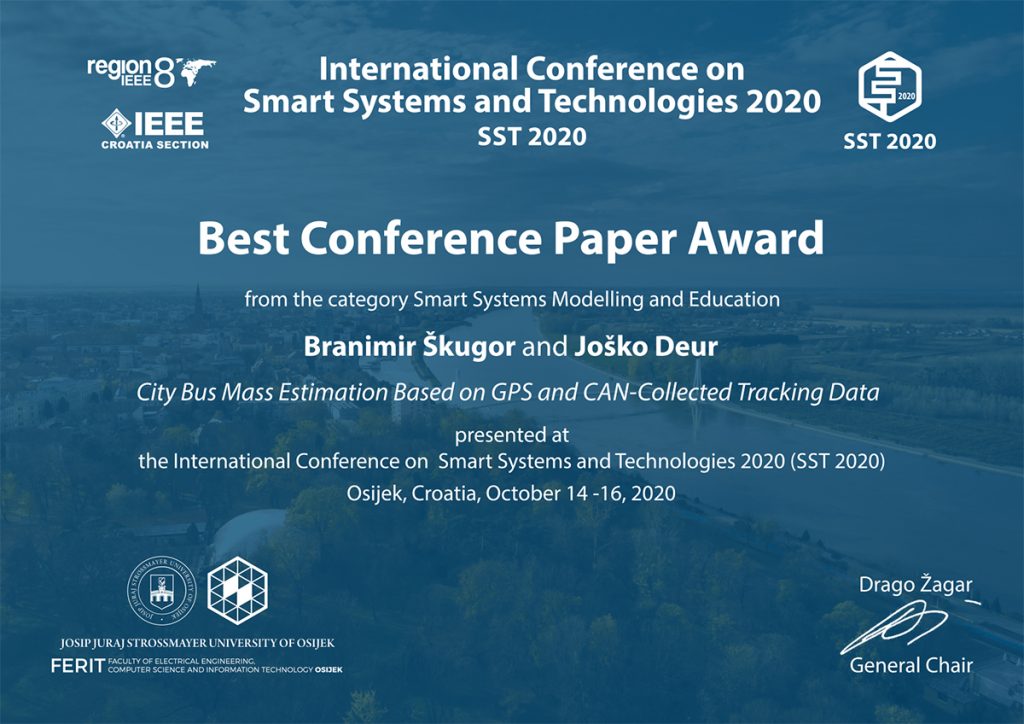
Smart Systems Modelling and Education
Branimir Škugor and Joško Deur
City Bus Mass Estimation Based on GPS and CAN-Collected Tracking Data


